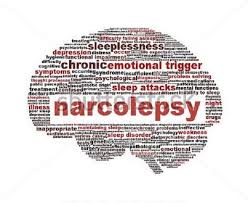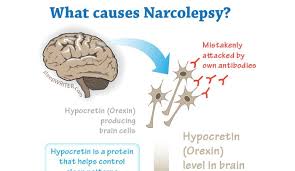Narcolepsy is a chronic sleep disorder characterized by daytime drowsiness and sudden attacks of sleep. People with narcolepsy often find it difficult to stay awake for long periods of time, regardless of the circumstances. Narcolepsy can cause serious disruptions in your daily routine.

About one in 2,000 people have some form of narcolepsy. Narcolepsy can impact nearly every aspect of your life. It is dangerous because you can have excessive sleepiness or a sleep attack at any time of the day, in the middle of any activity including eating, walking or driving. Operating a vehicle with untreated narcolepsy can be very dangerous and some states even have laws against it.
Causes:
The exact cause of narcolepsy is unknown. People with type 1 narcolepsy have low levels of the chemical hypocretin.Hypocretin is an important neurochemical in your brain that helps regulate wakefulness and REM sleep.
Hypocretin levels are particularly low in those who experience cataplexy. Exactly what causes the loss of hypocretin-producing cells in the brain isn’t known, but experts suspect it’s due to an autoimmune reaction.
It’s also likely that genetics play a role in the development of narcolepsy.

Types:
There are two types of narcolepsy:
- Narcolepsy Type 1 – This type of narcolepsy involves a combination of excessive daytime sleepiness and one or both of the following:
Cataplexy is when you have attacks that cause a sudden loss of muscle tone while you are awake. It may lead to slurred speech and buckling knees, or in more severe cases complete paralysis. These events are usually triggered by strong emotions such as joy, surprise, laughter or anger.
Low or absent CSF hypocretin-1 levels. Narcolepsy type 1 is caused by a deficiency of hypocretin (orexin). A patient with low hypocretin has narcolepsy type 1, even if they don’t exhibit cataplexy.
- Narcolepsy Type 2 – This type of narcolepsy occurs when you have continuous excessive sleepiness but no cataplexy. You may take a nap for a couple of hours and wake up feeling refreshed. But after a short time, you feel tired again.
Symptoms:
The symptoms of narcolepsy are;
- Cataplexy (loss of muscle control). Often, narcolepsy may cause you to have sudden loss of muscle control while awake, usually triggered by strong emotions, such as laughing or crying.
- Hallucinations. Some people with narcolepsy experience vivid, sometimes frightening, visual or auditory sensations while falling asleep or upon awakening.
- Sleep paralysis. You may be unable to move or talk at the beginning or end of sleep.
- Microsleep is a very brief sleep episode during which you continue to function (talk, put things away, etc.) and then awaken with no memory of the activities.
- Nighttime wakefulness. If you suffer from narcolepsy, you may have periods of wakefulness at night with hot flashes, elevated heart rate, and sometimes intense alertness.
- Rapid entry to REM sleep. Narcoleptics have unique sleep cycles where they may enter the REM or dream phase of sleep right after falling asleep, whereas most people take about 90 minutes to enter REM. Therefore, you’ll experience the characteristics of REM sleep (vivid dreams and muscle paralysis) at the beginning of sleep, even if that sleep is during the day.






